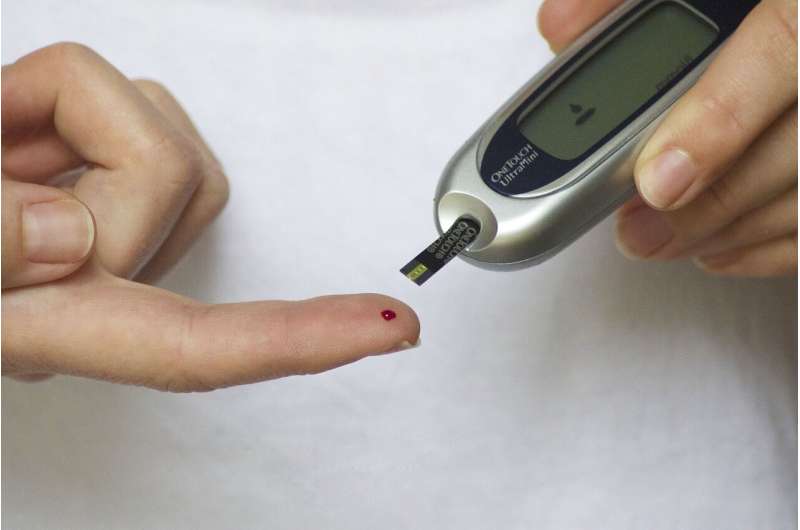Mechanism that may lead to metabolic memory and sustained diabetes complications

For people with diabetes, vascular complications like kidney disease and atherosclerosis, which can lead to poor health and even death, are seen at increased rates. In a new Nature Metabolism study, researchers led by City of Hope's Rama Natarajan, Ph.D., the National Business Products Industry Professor in Diabetes Research, identified for the first time an underlying mechanism for metabolic memory and its involvement in the development of such complications.
Prior episodes of poor glycemic control can result in long-term sustained complications for people with diabetes even if they are able to institute good glycemic control later on in life. This phenomenon is called metabolic memory, but the way it works is not well understood.
"While the link between epigenetics and diabetes and related complications has been reported before, this is the first large scale study in type 1 diabetes showing that a prior history of high glucose levels can cause persistent changes in DNA methylation to facilitate metabolic memory and trigger future diabetic complications," said Natarajan, the study's senior author, who is also professor and chair of the Department of Diabetes Complications & Metabolism within the Diabetes & Metabolism Research Institute at City of Hope. "This study provides the first evidence in humans supporting the link between DNA methylation in inflammatory and stem cells, a patient's blood sugar history and development of future complications."
Natarajan and her colleagues collaborated with the landmark Diabetes Control and Complications Trial/Epidemiology of Diabetes Interventions and Complications (DCCT/EDIC) clinical trial of type 1 diabetic patients to examine the role of epigenetics in metabolic memory. Epigenetics refers to heritable changes in gene expression and phenotypes that occur without changes in the person's genetic code. Epigenetic changes occur on chromatin which holds our DNA together in the nucleus and, in general, these alterations are induced by changes in lifestyles and the environment.
The researchers led by Zhuo (Nancy) Chen, who is the study's lead author and a staff scientist in Natarajan's lab, profiled DNA methylation, a type of epigenetic modification, in archived blood DNA samples from 500 participants enrolled in the DCCT/EDIC. They then compared the DNA methylation to their glycemic history and future development of complications. The team found that a prior history of hyperglycemia may induce persistent DNA methylation changes in blood cells and stem cells at key loci, which are epigenetically retained in certain cells to facilitate metabolic memory, likely through modifying enhancer activity at nearby genes.
This comprehensive study has systematically compared the epigenetic states of a large number of type 1 diabetic subjects with their glycemic history and their future development of key diabetic complications over 18 years, Natarajan said. Although epigenetic mechanisms have been implicated in diabetic complications before using experimental models or epigenome-wide association studies, the direct mediation role of DNA methylation in metabolic memory and future complications development had not been systematically studied.
Natarajan says that the study results could lead to the development of epigenetic marks as potential biomarkers for diabetic complication development and metabolic memory, which would help facilitate early intervention and prevent the progression to severe complications. In addition, the data can provide new insights into the mechanisms of metabolic memory related to the specific regions and genes affected by DNA methylation and these genes could also be potential drug targets. In fact, Natarajan is actively collaborating with Nagarajan Vaidehi, Ph.D., chair of the Department of Computational and Quantitative Medicine at City of Hope, and her group to use novel computational screening methods to identify small molecule inhibitors targeting molecules identified in the current study to aid in the treatment of complications and metabolic memory.
Several other follow-up studies are under way in Natarajan's laboratory, including collaborations with scientists both inside and outside of City of Hope. In the current study, she and her team performed associations between DNA methylation and two major diabetic complications: retinopathy, which can lead to blindness, and nephropathy, which can lead to kidney failure requiring dialysis or transplantation. Chen and Natarajan now plan to study associations with other long-term complications of type 1 diabetes, and also evaluate DNA methylation as a biomarker for predicting complications development.
"In addition, our team is expanding our study on the same group of patients as the Nature Metabolism research using whole-genome bisulfite sequencing to examine epigenetic changes over the whole genome," Natarajan said. "The goal is to uncover additional regions where DNA methylation is associated with metabolic memory or complication development besides those uncovered in the current paper."
Natarajan and her team are also continuing to collaborate with two co-authors of the Nature Metabolism paper, Arthur D. Riggs, Ph.D., the Samuel Rahbar Chair in Diabetes & Drug Discovery and director of the Diabetes & Metabolism Research Institute at City of Hope, and Joshua Tompkins, Ph.D., assistant research professor in the Department of Diabetes Complications & Metabolism, to examine DNA methylation at the single molecule level, and also evaluate epigenetic engineering approaches to reverse metabolic memory.
More information: Zhuo Chen et al, DNA methylation mediates development of HbA1c-associated complications in type 1 diabetes, Nature Metabolism (2020). DOI: 10.1038/s42255-020-0231-8



















